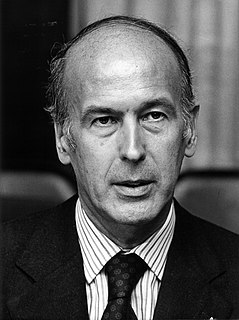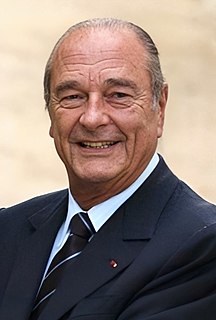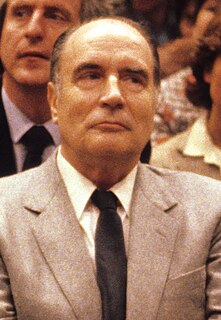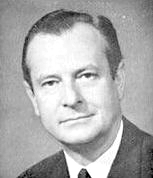
Jacques René Chirac was a French politician who served as President of France from 1995 to 2007. Chirac was previously Prime Minister of France from 1974 to 1976 and from 1986 to 1988, as well as Mayor of Paris from 1977 to 1995.

France is characterised by numerous political trends. This article provides an overview of some of them.

Valéry René Marie Georges Giscard d'Estaing, also known as Giscard or VGE, was a French politician who served as President of France from 1974 to 1981.

Les Guignols, formerly Les Guignols de l'info, was a daily satirical latex puppet show broadcast on the French television channel Canal+. It was created in 1988, inspired by Le Bébête Show (1982–95) and for the puppets form by the British Spitting Image (1984–96). Using the same structure as a news programme, the show satirized the political world, media, celebrities, French society, and international events.

The 2002 French presidential election consisted of a first round election on 21 April 2002, and a runoff election between the top two candidates on 5 May 2002. This presidential contest attracted a greater than usual amount of international attention because of far-right candidate Le Pen's unexpected appearance in the runoff election.

The Rally for the Republic, was a Gaullist and conservative political party in France. Originating from the Union of Democrats for the Republic (UDR), it was founded by Jacques Chirac in 1976 and presented itself as the heir of Gaullist politics. On 21 September 2002, the RPR was merged into the Union for the Presidential Majority, later renamed the Union for a Popular Movement (UMP).

The Union for French Democracy was a centre-right political party in France. It was founded in 1978 as an electoral alliance to support President Valéry Giscard d'Estaing in order to counterbalance the Gaullist preponderance over the political right in France. This name was chosen due to the title of Giscard d'Estaing's 1976 book, Démocratie française. The party brought together Christian democrats, liberals and radicals, and non-Gaullist conservatives, and described itself as centrist.
In France, the term Gaullist Party is usually used to refer to the largest party professing to be Gaullist. Gaullism claims to transcend the left–right divide in a similar way to populist republican parties elsewhere such as Fianna Fáil in Republic of Ireland, the Justicialist Party in Argentina and the African National Congress in South Africa.

The 1995 French presidential election to elect the fifth president of the French Fifth Republic took place on 23 April and 7 May 1995.

The 1981 French presidential election took place on 10 May 1981. François Mitterrand defeated incumbent president, Valery Giscard d'Estaing to become the first Socialist president of the Fifth Republic.

Marielle de Sarnez was a French politician who served as Secretary of State for European Affairs under Prime Minister Édouard Philippe.

The 1974 French presidential election were held in France in 1974, following the death of President Georges Pompidou. They went to a second round, and were won by Valéry Giscard d'Estaing by a margin of 1.6%. It is to date the closest presidential election in French history.

Jean Adrien François Lecanuet was a French centrist politician.

French legislative elections took place on 14 June and 21 June 1981 to elect the seventh National Assembly of the Fifth Republic.
French presidential debates, broadcast on TV, traditionally occurred only between the two rounds of the presidential elections.
In 2017, for the first time, a presidential debate took place prior to the first round.

The 2007 French presidential election, the ninth of the Fifth French Republic was held to elect the successor to Jacques Chirac as president of France for a five-year term.

The French presidential inauguration is an event marking the beginning of a new term for the President of France.

The Socialist Party is a centre-left, social-democratic political party in France. It holds pro-European views. The PS was for decades the largest party of the French left and used to be one of the two major political parties in the French Fifth Republic, along with The Republicans. It replaced the earlier French Section of the Workers' International in 1969 and is currently led by First Secretary Olivier Faure. The PS is a member of the Party of European Socialists, Progressive Alliance and Socialist International.

The Republicans is a centre-right liberal-conservative political party in France, largely inspired by the Gaullist tradition. It holds pro-European views.

The 2022 French presidential election was held on 10 and 24 April 2022. As no candidate won a majority in the first round, a runoff was held, in which Emmanuel Macron defeated Marine Le Pen and was re-elected as President of France. Macron, from La République En Marche! (LREM), who won the 2017 presidential election and whose first term lasts until 13 May 2022, announced on 3 March 2022 that he would run for re-election. He faced Le Pen, leader of the National Rally, in the second round, after previously defeating her in 2017. He is the first President of France to have won a re-election bid since Jacques Chirac in 2002.
















